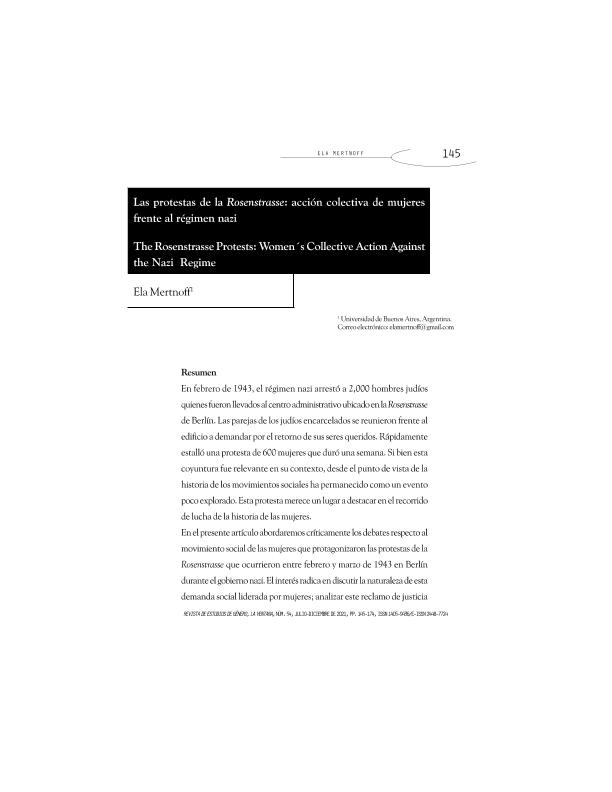Artículo
En febrero de 1943, el régimen nazi arrestó a 2.000 hombres judíos quienes fueron llevados al centro administrativo ubicado en la Rosenstrasse de Berlín. Las parejas de los judíos encarcelados se reunieron frente al edificio a demandar por el retorno de sus seres queridos. Rápidamente estalló una protesta de 600 mujeres que duró una semana. Si bien esta coyuntura fue relevante en su contexto, desde el punto de vista de la historia de los movimientos sociales ha permanecido como un evento poco explorado. Esta protesta merece un lugar a destacar en el recorrido de lucha de la historia de las mujeres.En el presente artículo abordaremos críticamente los debates respecto al movimiento social de las mujeres que protagonizaron las protestas de la Rosenstrasse que ocurrieron entre febrero y marzo de 1943 en Berlín durante el gobierno nazi. El interés radica en discutir la naturaleza de esta demanda social liderada por mujeres; analizar este reclamo de justicia tomando en cuenta el período desfavorable para el movimiento feminista alemán y los derechos de las mujeres; identificar su posición respecto a la perspectiva de género; y evaluar el impacto del movimiento social.La tesis de este artículo es que las protestas de la Rosenstrasse significaron un acto extraordinario de resistencia exitosa que demuestran el conocimiento del terror nazi por parte de los testigos alemanes. Estas protestas, a pesar de no ser antisistema, fueron una acción colectiva espontánea y lograron incidir tanto en la opinión pública como en el gobierno nazi en un contexto de fragilidad estatal. Si bien las mujeres se movilizaron interpelando al Estado desde su lugar de esposas, no desde una perspectiva feminista sino desde la moralidad de los valores tradicionales del hogar y la familia, no podemos dejar de resaltar la importancia que esta protesta tuvo en la construcción de la memoria de los movimientos sociales. In February of 1943, the Nazi regime arrested 2,000 Jewish men which were taken to the administrative office located on Rosenstrasse in Berlin. The spouses of the incarcerated Jews gathered in front of the building to demand the return of their loved ones. A protest of 600 women that lasted a week quickly broke out. Although this event was relevant within its context, from the point of view of the history of social movements it has remained unexplored. This protest deserves recognition within the journey of women struggles in history.This paper will critically address the debates regarding the women’s social movement involved in the Rosenstrasse protests that took place between February and March of 1943 in Berlin during the Nazi government. The interest lies in discussing the nature of this social demand led by women; analyze this claim of justice taking into account the unfavorable period for the German feminist movement and for women’s rights; identify their position regarding gender perspective; and to assess the impact of the social movement. The thesis of this paper is that the Rosenstrasse protests meant an extraordinary act of a successful resistance which prove the awareness of the Nazi terror on account of German bystanders. These protests, despite not being against the system, were a spontaneous collective action that managed to have an impact on public opinion and on the Nazi government within a context of state weakness. Even if women questioned the state from their position as wives, not from a feminist perspective but from the morality of traditional values such as home and family, the importance of this protest in the memory construction of social movements cannot be underestimated.
Las protestas de la Rosenstrasse: acción colectiva de mujeres frente al régimen nazi
Título:
The Rosenstrasse Protests: Women´s Collective Action Against the Nazi Regime
Fecha de publicación:
07/2021
Editorial:
Universidad de Guadalajara
Revista:
Revista de Estudios de Género
ISSN:
2448-7724
Idioma:
Español
Tipo de recurso:
Artículo publicado
Clasificación temática:
Resumen
Archivos asociados
Licencia
Identificadores
Colecciones
Articulos(SEDE CENTRAL)
Articulos de SEDE CENTRAL
Articulos de SEDE CENTRAL
Citación
Mertnoff, Ela; Las protestas de la Rosenstrasse: acción colectiva de mujeres frente al régimen nazi; Universidad de Guadalajara; Revista de Estudios de Género; 6; 54; 7-2021; 145-174
Compartir
Altmétricas




